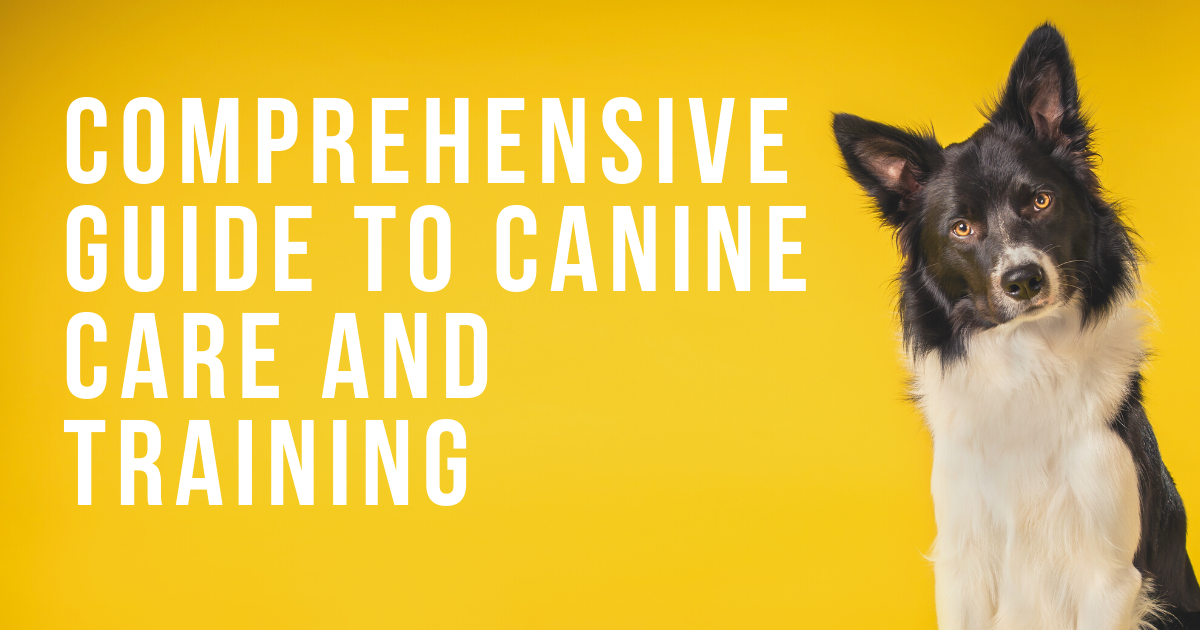
Taking care of a dog requires a lot of commitment, patience, and love. Here is a comprehensive guide to canine care and training that can help you provide the best possible care for your furry friend.
Nutrition and Exercise

A balanced diet and plenty of exercise are crucial for your dog’s overall health and well-being. When choosing dog food, look for high-quality ingredients and avoid fillers and byproducts. Your dog’s food should also be appropriate for their age, breed, and activity level. Puppies require more protein and calories than adult dogs, while senior dogs may need a diet with lower calories and added nutrients.
In addition to a healthy diet, exercise is also important for your dog’s physical and mental health. Daily walks, playtime, and other physical activities can help prevent obesity and other health issues. You should also make sure your dog has access to fresh water at all times, especially during and after exercise.
Grooming and Hygiene

Proper grooming and hygiene are essential to keep your dog looking and feeling their best. Regular brushing helps remove loose hair, prevent matting, and distribute natural oils throughout your dog’s coat. You should also trim your dog’s nails regularly to prevent them from getting too long and causing discomfort.
It’s also important to clean your dog’s ears, teeth, and eyes. Dirty ears can lead to infections, while dental issues can cause pain, infections, and other health problems. Regular teeth brushing and professional dental cleanings can help keep your dog’s teeth and gums healthy. Additionally, wiping your dog’s eyes with a damp cloth can help prevent irritation and infections.
Finally, bathing your dog regularly can help keep their coat clean and free of parasites. However, you should avoid over-bathing your dog, as this can strip their skin of natural oils and cause dryness.
Health Care

Regular health care is important to prevent and detect health issues in your dog. This includes regular visits to the veterinarian for checkups, vaccinations, and preventative care. It’s also important to keep up with your dog’s medication, such as flea and tick preventatives and heartworm medication.
You should also be aware of your dog’s behavior and any signs of illness or discomfort. This can include changes in appetite, energy level, or bathroom habits. Regular grooming can also help you detect any lumps, bumps, or other issues on your dog’s skin.
Finally, training and socialization are important for your dog’s overall well-being. Basic obedience training can help prevent behavior issues, while socialization can help your dog feel comfortable around other people and animals. Positive reinforcement is a popular training method that rewards good behavior and encourages your dog to learn new things. By following these guidelines, you can help ensure your dog is happy, healthy, and well-behaved.
Behavioral Training

Behavioral training is an important aspect of canine care and training. Dogs are social animals, and they require socialization and obedience training to become well-behaved members of society. Socialization involves exposing your dog to different people, animals, and environments to help them develop social skills and confidence.
Obedience training, on the other hand, teaches your dog basic commands and how to behave in different situations. This can include commands like “sit,” “stay,” “come,” and “heel.” Positive reinforcement techniques, such as rewarding your dog with treats and praise, are effective in obedience training.
Additionally, behavioral training can address specific issues, such as separation anxiety, aggression, and destructive behavior. A professional dog trainer can help identify the cause of these issues and develop a customized training plan to address them.
Mental Stimulation
Mental stimulation is important for your dog’s mental health and well-being. This can include playing with interactive toys, providing puzzle feeders, and practicing obedience training. Mental stimulation can also prevent boredom and destructive behavior.
Overall, taking care of a dog requires a lot of time, commitment, and love. By providing your dog with proper nutrition, exercise, grooming, health care, behavioral training, safety, and mental stimulation, you can ensure your furry friend is happy, healthy, and well-behaved.
Socialization
Socialization is an essential aspect of canine care and training. It involves exposing your dog to different people, animals, and environments to help them develop social skills and confidence. Socialization should start early in your dog’s life and continue throughout their lifetime.
Socialization can prevent behavioral issues, such as aggression and anxiety, and promote positive interactions with other animals and humans. It can also help your dog feel more comfortable in different environments, such as at the vet or groomer.
Leave a Comment
You must be logged in to post a comment.











1 Comment